山东省淄博十中2017-2018学年高一下学期期中考试英语试题(无听力音频有文字材料)
文档属性
| 名称 | 山东省淄博十中2017-2018学年高一下学期期中考试英语试题(无听力音频有文字材料) | 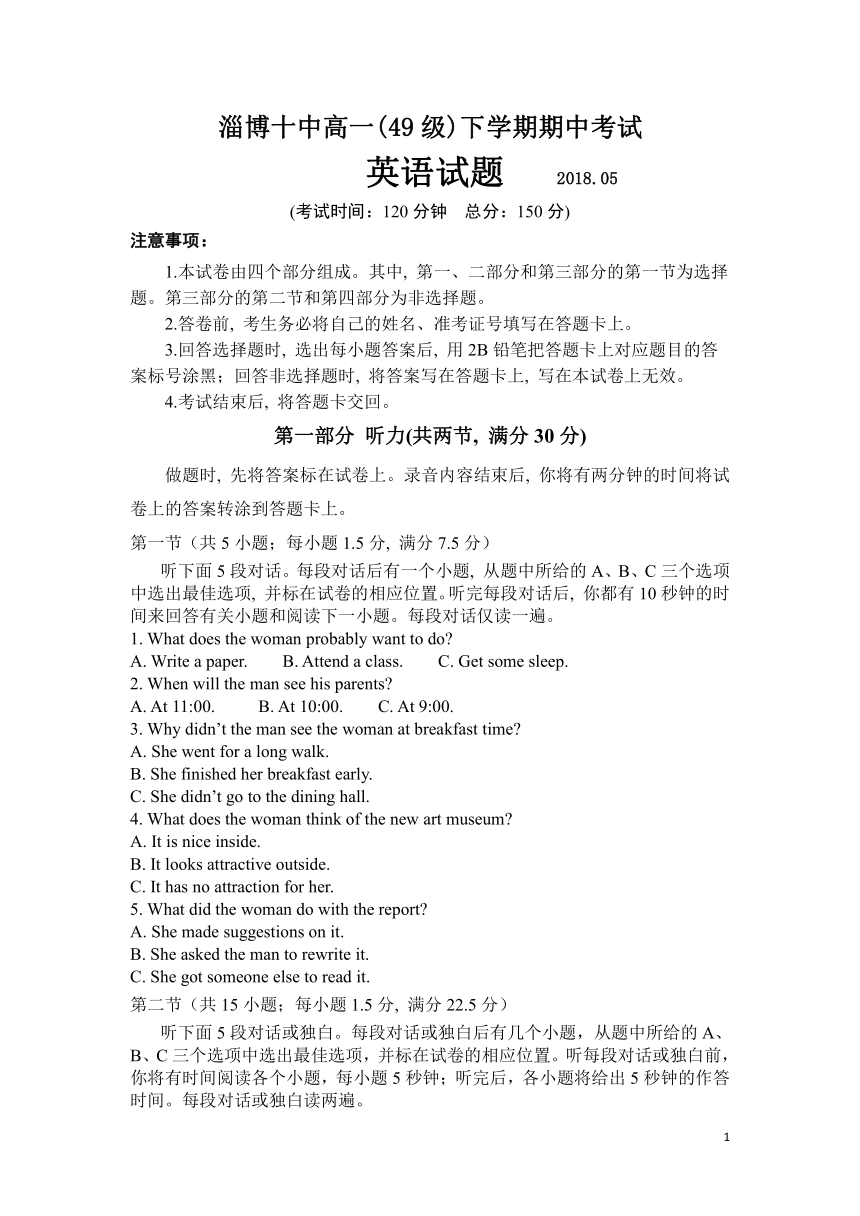 | |
| 格式 | zip | ||
| 文件大小 | 81.0KB | ||
| 资源类型 | 教案 | ||
| 版本资源 | 外研版 | ||
| 科目 | 英语 | ||
| 更新时间 | 2019-01-23 16:10:00 | ||
图片预览

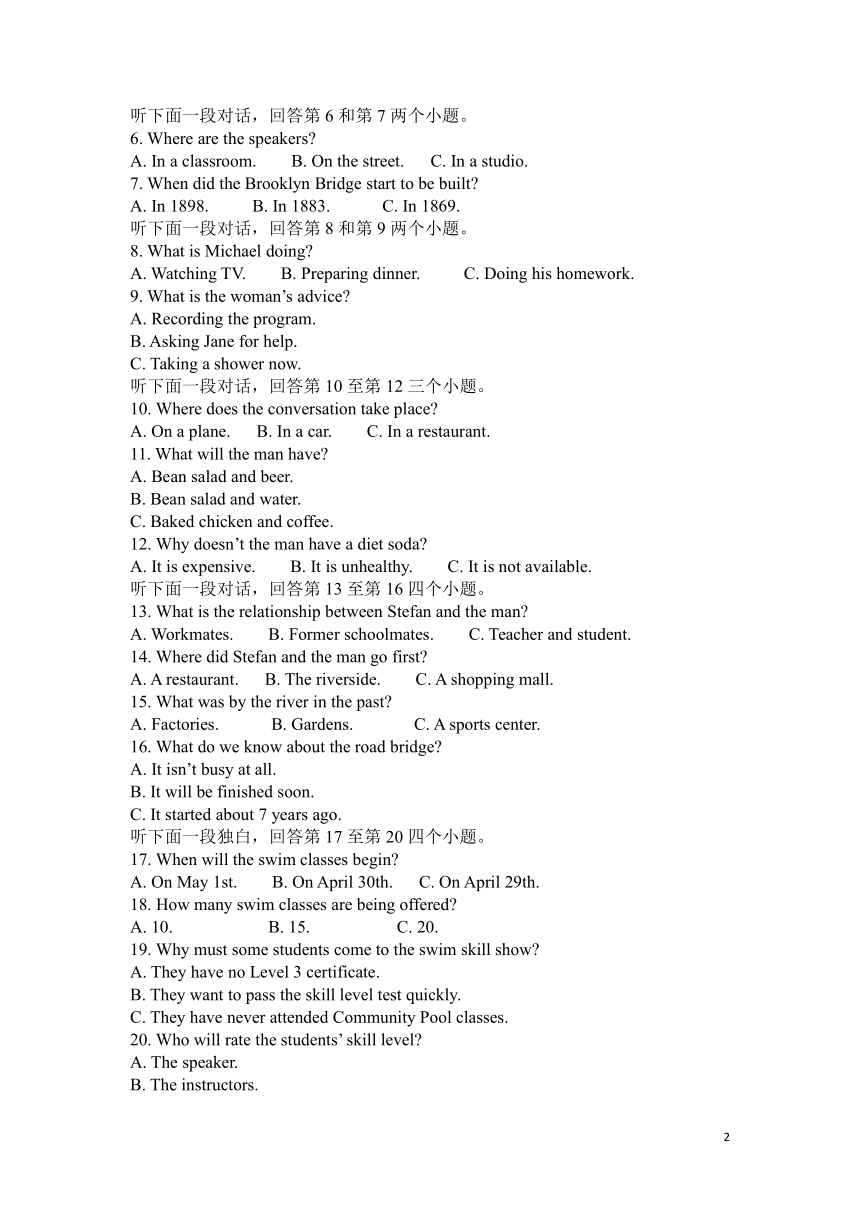
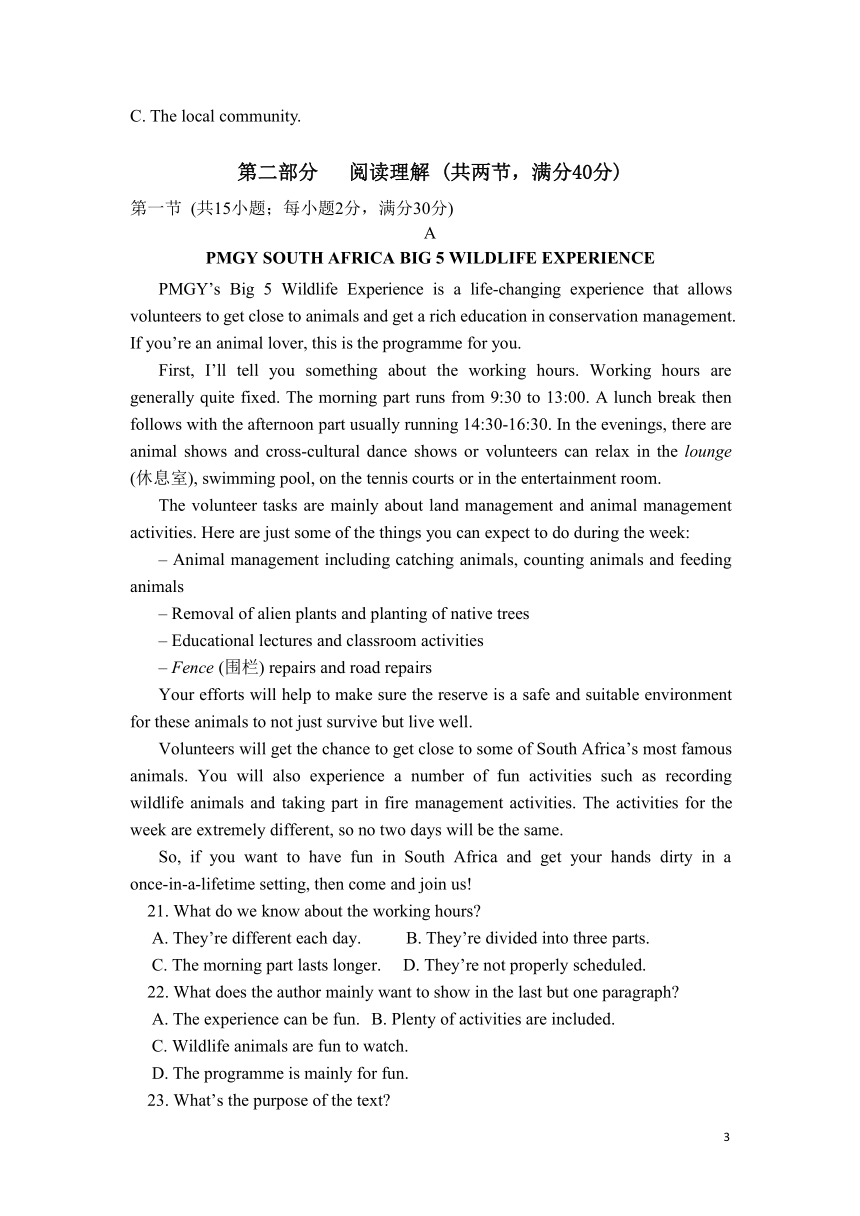
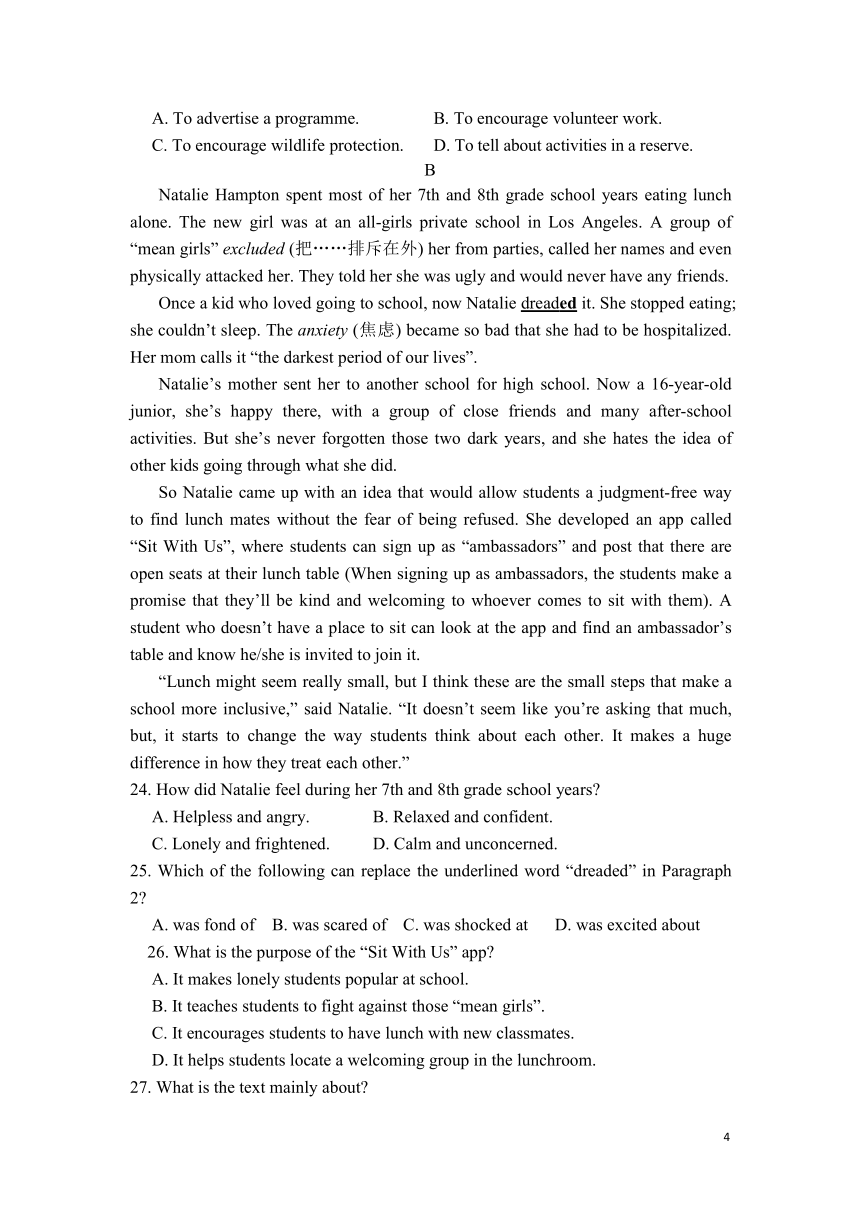
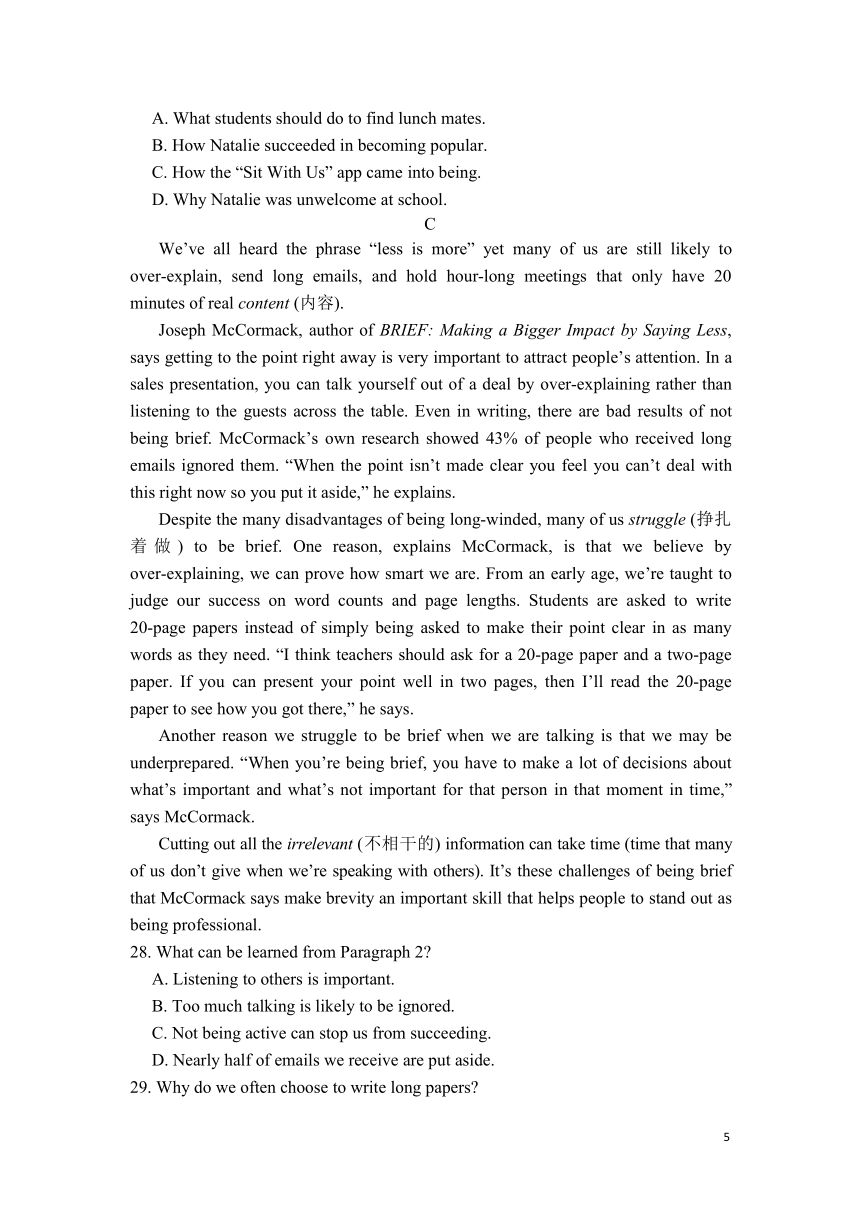
文档简介
淄博十中高一(49级)下学期期中考试
英语试题 2018.05
(考试时间:120分钟 总分:150分)
注意事项:
1.本试卷由四个部分组成。其中, 第一、二部分和第三部分的第一节为选择题。第三部分的第二节和第四部分为非选择题。
2.答卷前, 考生务必将自己的姓名、准考证号填写在答题卡上。
3.回答选择题时, 选出每小题答案后, 用2B铅笔把答题卡上对应题目的答案标号涂黑;回答非选择题时, 将答案写在答题卡上, 写在本试卷上无效。
4.考试结束后, 将答题卡交回。
第一部分 听力(共两节, 满分30分)
做题时, 先将答案标在试卷上。录音内容结束后, 你将有两分钟的时间将试卷上的答案转涂到答题卡上。
第一节(共5小题;每小题1.5分, 满分7.5分)
听下面5段对话。每段对话后有一个小题, 从题中所给的A、B、C三个选项中选出最佳选项, 并标在试卷的相应位置。听完每段对话后, 你都有10秒钟的时间来回答有关小题和阅读下一小题。每段对话仅读一遍。
1. What does the woman probably want to do?
A. Write a paper. B. Attend a class. C. Get some sleep.
2. When will the man see his parents?
A. At 11:00. B. At 10:00. C. At 9:00.
3. Why didn’t the man see the woman at breakfast time?
A. She went for a long walk.
B. She finished her breakfast early.
C. She didn’t go to the dining hall.
4. What does the woman think of the new art museum?
A. It is nice inside.
B. It looks attractive outside.
C. It has no attraction for her.
5. What did the woman do with the report?
A. She made suggestions on it.
B. She asked the man to rewrite it.
C. She got someone else to read it.
第二节(共15小题;每小题1.5分, 满分22.5分)
听下面5段对话或独白。每段对话或独白后有几个小题,从题中所给的A、B、C三个选项中选出最佳选项,并标在试卷的相应位置。听每段对话或独白前,你将有时间阅读各个小题,每小题5秒钟;听完后,各小题将给出5秒钟的作答时间。每段对话或独白读两遍。
听下面一段对话,回答第6和第7两个小题。
6. Where are the speakers?
A. In a classroom. B. On the street. C. In a studio.
7. When did the Brooklyn Bridge start to be built?
A. In 1898. B. In 1883. C. In 1869.
听下面一段对话,回答第8和第9两个小题。
8. What is Michael doing?
A. Watching TV. B. Preparing dinner. C. Doing his homework.
9. What is the woman’s advice?
A. Recording the program.
B. Asking Jane for help.
C. Taking a shower now.
听下面一段对话,回答第10至第12三个小题。
10. Where does the conversation take place?
A. On a plane. B. In a car. C. In a restaurant.
11. What will the man have?
A. Bean salad and beer.
B. Bean salad and water.
C. Baked chicken and coffee.
12. Why doesn’t the man have a diet soda?
A. It is expensive. B. It is unhealthy. C. It is not available.
听下面一段对话,回答第13至第16四个小题。
13. What is the relationship between Stefan and the man?
A. Workmates. B. Former schoolmates. C. Teacher and student.
14. Where did Stefan and the man go first?
A. A restaurant. B. The riverside. C. A shopping mall.
15. What was by the river in the past?
A. Factories. B. Gardens. C. A sports center.
16. What do we know about the road bridge?
A. It isn’t busy at all.
B. It will be finished soon.
C. It started about 7 years ago.
听下面一段独白,回答第17至第20四个小题。
17. When will the swim classes begin?
A. On May 1st. B. On April 30th. C. On April 29th.
18. How many swim classes are being offered?
A. 10. B. 15. C. 20.
19. Why must some students come to the swim skill show?
A. They have no Level 3 certificate.
B. They want to pass the skill level test quickly.
C. They have never attended Community Pool classes.
20. Who will rate the students’ skill level?
A. The speaker.
B. The instructors.
C. The local community.
第二部分 阅读理解 (共两节,满分40分)
第一节 (共15小题;每小题2分,满分30分)
A
PMGY SOUTH AFRICA BIG 5 WILDLIFE EXPERIENCE
PMGY’s Big 5 Wildlife Experience is a life-changing experience that allows volunteers to get close to animals and get a rich education in conservation management. If you’re an animal lover, this is the programme for you.
First, I’ll tell you something about the working hours. Working hours are generally quite fixed. The morning part runs from 9:30 to 13:00. A lunch break then follows with the afternoon part usually running 14:30-16:30. In the evenings, there are animal shows and cross-cultural dance shows or volunteers can relax in the lounge (休息室), swimming pool, on the tennis courts or in the entertainment room.
The volunteer tasks are mainly about land management and animal management activities. Here are just some of the things you can expect to do during the week:
– Animal management including catching animals, counting animals and feeding animals
– Removal of alien plants and planting of native trees
– Educational lectures and classroom activities
– Fence (围栏) repairs and road repairs
Your efforts will help to make sure the reserve is a safe and suitable environment for these animals to not just survive but live well.
Volunteers will get the chance to get close to some of South Africa’s most famous animals. You will also experience a number of fun activities such as recording wildlife animals and taking part in fire management activities. The activities for the week are extremely different, so no two days will be the same.
So, if you want to have fun in South Africa and get your hands dirty in a once-in-a-lifetime setting, then come and join us!
21. What do we know about the working hours?
A. They’re different each day. B. They’re divided into three parts.
C. The morning part lasts longer. D. They’re not properly scheduled.
22. What does the author mainly want to show in the last but one paragraph?
A. The experience can be fun. B. Plenty of activities are included.
C. Wildlife animals are fun to watch.
D. The programme is mainly for fun.
23. What’s the purpose of the text?
A. To advertise a programme. B. To encourage volunteer work.
C. To encourage wildlife protection. D. To tell about activities in a reserve.
B
Natalie Hampton spent most of her 7th and 8th grade school years eating lunch alone. The new girl was at an all-girls private school in Los Angeles. A group of “mean girls” excluded (把……排斥在外) her from parties, called her names and even physically attacked her. They told her she was ugly and would never have any friends.
Once a kid who loved going to school, now Natalie dreaded it. She stopped eating; she couldn’t sleep. The anxiety (焦虑) became so bad that she had to be hospitalized. Her mom calls it “the darkest period of our lives”.
Natalie’s mother sent her to another school for high school. Now a 16-year-old junior, she’s happy there, with a group of close friends and many after-school activities. But she’s never forgotten those two dark years, and she hates the idea of other kids going through what she did.
So Natalie came up with an idea that would allow students a judgment-free way to find lunch mates without the fear of being refused. She developed an app called “Sit With Us”, where students can sign up as “ambassadors” and post that there are open seats at their lunch table (When signing up as ambassadors, the students make a promise that they’ll be kind and welcoming to whoever comes to sit with them). A student who doesn’t have a place to sit can look at the app and find an ambassador’s table and know he/she is invited to join it.
“Lunch might seem really small, but I think these are the small steps that make a school more inclusive,” said Natalie. “It doesn’t seem like you’re asking that much, but, it starts to change the way students think about each other. It makes a huge difference in how they treat each other.”
24. How did Natalie feel during her 7th and 8th grade school years?
A. Helpless and angry. B. Relaxed and confident.
C. Lonely and frightened. D. Calm and unconcerned.
25. Which of the following can replace the underlined word “dreaded” in Paragraph 2?
A. was fond of B. was scared of C. was shocked at D. was excited about
26. What is the purpose of the “Sit With Us” app?
A. It makes lonely students popular at school.
B. It teaches students to fight against those “mean girls”.
C. It encourages students to have lunch with new classmates.
D. It helps students locate a welcoming group in the lunchroom.
27. What is the text mainly about?
A. What students should do to find lunch mates.
B. How Natalie succeeded in becoming popular.
C. How the “Sit With Us” app came into being.
D. Why Natalie was unwelcome at school.
C
We’ve all heard the phrase “less is more” yet many of us are still likely to over-explain, send long emails, and hold hour-long meetings that only have 20 minutes of real content (内容).
Joseph McCormack, author of BRIEF: Making a Bigger Impact by Saying Less, says getting to the point right away is very important to attract people’s attention. In a sales presentation, you can talk yourself out of a deal by over-explaining rather than listening to the guests across the table. Even in writing, there are bad results of not being brief. McCormack’s own research showed 43% of people who received long emails ignored them. “When the point isn’t made clear you feel you can’t deal with this right now so you put it aside,” he explains.
Despite the many disadvantages of being long-winded, many of us struggle (挣扎着做) to be brief. One reason, explains McCormack, is that we believe by over-explaining, we can prove how smart we are. From an early age, we’re taught to judge our success on word counts and page lengths. Students are asked to write 20-page papers instead of simply being asked to make their point clear in as many words as they need. “I think teachers should ask for a 20-page paper and a two-page paper. If you can present your point well in two pages, then I’ll read the 20-page paper to see how you got there,” he says.
Another reason we struggle to be brief when we are talking is that we may be underprepared. “When you’re being brief, you have to make a lot of decisions about what’s important and what’s not important for that person in that moment in time,” says McCormack.
Cutting out all the irrelevant (不相干的) information can take time (time that many of us don’t give when we’re speaking with others). It’s these challenges of being brief that McCormack says make brevity an important skill that helps people to stand out as being professional.
28. What can be learned from Paragraph 2?
A. Listening to others is important.
B. Too much talking is likely to be ignored.
C. Not being active can stop us from succeeding.
D. Nearly half of emails we receive are put aside.
29. Why do we often choose to write long papers?
A. We believe the more, the better.
B. We are asked to do so by teachers.
C. Teachers are fond of reading long papers.
D. Only long papers can make our point clear.
30. Why do we struggle to be brief according to Paragraph 4?
A. We just prepare something important.
B. It’s hard to make decisions sometimes.
C. We don’t organize our ideas well before talking.
D. It’s impossible to tell what’s important in a short time.
31. What is most likely to be talked about in the paragraph following the text?
A. The tips for being brief.
B. The challenges of being brief.
C. The skills we should develop in life.
D. The importance of being professional.
D
While being popular in high school might be every teenager’s goal, belonging to a closely connected group may pay off more in the long run. The types of friendships you form during your teenage years can affect your mental (精神的) health in adulthood, according to a new study.
Researchers from the University of Virginia examined 169 young people over a period of 10 years, from the time they were 15 until they were 25. The study authors checked on these young people each year to judge the state of their friendships and their mental health. Researchers asked them questions about who their close friends were, as well as examined issues like anxiety, social acceptance and self-worth. The authors also interviewed the teenagers’ close friends on how they viewed their relationships with the study volunteers.
Friendship quality and popularity were studied by the reports from those young people’s friends. The study authors defined high-quality friendships as close friendships in which the two persons mentally depended on each other and allowed for intimate (亲密的) exchanges. Popularity was determined by how many of the teens’ classmates regarded them as someone they wanted to hang out with.
Those with high-quality friendships at age 15 seemed to be better when they were 25 in terms of health and happiness. They had lower social anxiety and increased sense of self-worth. Those who were considered more popular by their friends showed higher levels of social anxiety as adults.
It’s important to point out here that the sample (样本) size of the study was somewhat small, so it’s unclear if this is valuable in a general population. However, former research shows that friendships during teenage years can improve physical and emotional health. And friendships in general are good for your health: Studies show they decrease stress, help you deal with problems and encourage you to make better lifestyle choices.
32. What did the researchers do in the study?
A. They improved some young people’s self-worth.
B. They found 169 young people who were popular.
C. They examined people’s mental health every 10 years.
D. They recorded friendships of the same young people in 10 years.
33. Who is considered popular by the researchers?
A. A teenager who reports to have many friends.
B. A teenager who is liked by lots of his classmates.
C. A teenager who has many high-quality friendships.
D. A teenager who can do many things for his classmates.
34. What does Paragraph 4 mainly tell us?
A. Popular adults met more problems in their lives.
B. It was common that adults suffered social anxiety.
C. High-quality friendships helped teenagers succeed.
D. Teenagers with close friendships grew up to be happier.
35. Which of the following shows the structure of the whole text?
① ① ①② ①②
↙↙↘↘ ↙↓↘ ↙↓↘ ↙ ↘
② ③ ④ ⑤ ② ③ ④ ③ ④ ⑤ ③ ④
↘ ↙ ↘ ↙
⑤ ⑤
A B C D
第二节 (共5小题;每小题2分,满分10分)
根据短文内容,从短文后的选项中选出能填入空白处的最佳选项。选项中有两项为多余选项。
The science teacher, Mr. Litmus, had asked his students to study animals. They would write a short report, and then tell the rest of the class what they found. Some talked about dogs; others chose horses. 36
“I found that flies are terribly bad-tempered (脾气暴躁的),” said Sophie, very sure of herself. 37 Then Sophie explained, “I spent hours watching flies in my house. When they flew normally, everything was OK, but when they found a window, they would really start buzzing (嗡嗡叫). 38 I inspected the flies really closely, and saw that what they were really doing was shouting and complaining (抱怨). They just couldn’t fly out of the window, though they beat their heads against the glass again and again.”
Mr. Litmus was amused. 39 Instead, the fly was a kind of animal that has different levels of intelligence. Students agreed that the next day they’d bring a list of animals in their order of intelligence.
And what happened next caused a heated discussion in the science class. Many parents had to come and complain because they were considered by their children to be the least intelligent! 40
Although Mr. Litmus had to do a lot of explaining and calm down quite a few parents, it helped some of them realize that, although they weren’t stupid, they often behaved not very intelligently.
A. She made a decision to study flies.
B. Everyone smiled, waiting for her to continue.
C. Parents showed great interest in the science class.
D. But the most interesting discovery of all was made by little Sophie.
E. I had always thought they made that noise with their wings, but they don’t.
F. This, said the children, was because the parents did nothing but complain.
G. He explained to the class that that form of fly behavior had nothing to do with anger.
第三部分 语言知识运用 (共两节,满分35分)
第一节 完形填空 (共20小题;每小题1分,满分20分)
When I was in fifth grade, you could tell me, “Colin, it’s not cool to wear the same pair of sweatpants (宽松的运动裤) every day,” but I was comfortable. And you could tell me, “Colin, it’s not cool to be an active 41 of your local church’s clown (小丑) group.” But I wouldn’t 42 .
On the first day of my middle school, our teacher asked us to 43 a piece of paper with “get to know you” questions. I 44 that she would read them in private, so I felt 45 to share my secrets.
Then the teacher 46 the papers, mixed them up, and gave them back to us. My sheet 47 ended up in the hands of a boy who was one of the 48 . His “favorite answers” of mine were the worst ones. The first question was “What’s your favorite 49 ?” The other kids wrote Scream and Universal Soldier. He 50 my answer, Beauty and the Beast. The class burst out laughing, and my 51 burned. The next question was “What would you like to 42 on weekends?” The other kids wrote “Hang out with friends” and “Go to the mall”. I wrote “Perform with clowns”. Another 53 .
But then, something 54 happened. A voice from the back of the room said, “Guys, cut it out. What is the point if we just 55 each other?” The voice belonged to Michelle Siever. And the room went 56 .
Today, I don’t remember the teacher’s or the kids’ names, 57 I remember Michelle Siever’s name. I remember how it 58 when she spoke up for me. You can be cool, and you may be remembered for a little while. But if you 49 somebody when they need you most, then you will be remembered as their 60 for the rest of their life.
41. A. player B. director C. member D. follower
42. A. return B. stop C. go D. reply
43. A. fill out B. cut out C. fold D. find
44. A. knew B. thought C. forgot D. hoped
45. A. happy B. confident C. shy D. safe
46. A. collected B. shared C. kept D. finished
47. A. naturally B. strangely C. finally D. immediately
48. A. youngest B. bravest C. cleverest D. meanest
49. A. performance B. story C. course D. movie
50. A. read B. got C. discovered D. guessed
51. A. heart B. mind C. face D. brain
52. A. do B. make C. prepare D. improve
53. A. joke B. laughter C. example D. report
54. A. interesting B. important C. amazing D. bad
55. A. fight against B. learn from C. take pride in D. make fun of
56. A. mad B. wild C. deaf D. silent
57. A. but B. so C. or D. for
58. A. sounded B. felt C. looked D. seemed
59. A. love B. support C. miss D. ignore
60. A. teacher B. guide C. hero D. star
第二节 (共10小题;每小题1.5分,满分15分)
阅读下面短文,在空白处填入1个适当的单词或括号内单词的正确形式。
The English language has many expressions about chicken. And, for the most part, none of them represent (代表) anything good.
For example, a chicken can describe someone who is 61 (scare) or afraid. Children often laugh at each other about being chicken. The phrasal verb “chicken out” has a similar 62 (mean). If you “chicken out”, you decide not 63 (do) something because you are too frightened. For example, let’s say you and your friends are at a party. They ask you to go on stage and sing with the band that is 44 (play). “No problem,” you say. You’re not chicken; you tell yourself. But the closer you walk toward 65 stage, the 66 (fast) your heart beats. Without realizing it, you are backing away 67 the stage and running toward the restroom. You have 68 (chicken) out.
If you are running around like a chicken with 69 (it) head cut off, you are acting in a crazy way. You don’t seem in control of your mind or body. This comes from the fact 70 sometimes when a chicken’s head is cut off, its body can still run around before it dies.
61. ________ 62. ________ 63. ________ 64. ________ 65. ________
66. ________ 67. ________ 68. ________ 69. ________ 70. ________
第三部分 写作 (共两节,满分45分)
第一节 基础知识测试(共10小题;每小题1分, 满分10分)
I. 单词拼写:根据汉意或用括号内所给单词的正确形式填空,一空一词。(共5小题;每小题1分,满分5分)
71.It is ____________ (体贴的) of you to help your friends in many ways.
72.Please state your name, address and o_____________(职业)
73.The following is a ____________(summarize) of our conclusion.
74.C__________(确信)of the accuracy of data, they stuck to their opinion.
75.At the sound,birds in the tree flew in all ___________(方向)
II.背诵填空:下列句子均选自本阶段要求背诵的段落或文章,请根据原文完成句子,每空一词。与原文不符的答案不得分。(共5小题,每小题1分,满分5分)
76. _________ Victor Hugo once said, “Laughter is the sun that drives winter from the human face ”, and ________ __________ _________ nobody has been able to do this _________ __________ Charlie Chaplin.
77. Instead he and another man are _________ in a small hut during a snowstorm _________ __________ __________ __________ .
78. This special strain of rice _________ ___________ __________ ___________ __________ 20% more of the crop in the same fields.
79.__________ ___________ her mother came to help her the first few months __________ __________ ___________ to begin her project.
80.I look carefully at the text and realized that it __________ _________ __________ women ___________ _________ ___________.
第二节 短文改错 (共10小题;每小题1分,满分10分)
短文中共有10处语言错误,每句中最多有两处。每处错误仅涉及一个单词的增加、删除或修改。
The winter vacation is coming. I will like to share my plan.
Firstly, I’m going to have a good rest. I will read more useful books because reading books are not only interesting but helps me have more knowledges. Secondly, I will spend more time chatting my parents and helping her do some housework. Thirdly, I am going to take a part in social activities such that I can know more about our society. And if possibly, I want to make a trip to Xiamen.
I’m sure I’ll have an interested and meaningful winter holiday. I was looking forward to it.
第三节 书面表达 (满分25分)
假设你是李华,你所在城市的交通拥挤问题日趋严重,交通事故时有发生,特别是在上下班高峰时段。请根据以下提示,用英语给市政府写一封信,反映交通状况并提出自己的建议。
提示:1.反映交通状况;
2.提出改善建议;
3.希望和祝福。
注意:1.可适当增加细节,以使行文连贯;
2.词数100左右;
3.信的开头和结尾已经为你写好,不计入总词数。
Dear Sir/Madam,
I'm writing to reflect the traffic situation of our city.
Yours,
Li Hua
淄博十中高一(49级)下学期期中考试
英语试题答案 2018.05.16
听 力 (共20小题;每小题1.5分, 满分30分)
1—5CBACA 6—10BCCAA 11—15BCBAA 16—20CABCB
阅读理解 (共20小题;每小题2分, 满分40分)
21-25 CAACB 26-30 DCBAC 31-35 ADBDB 36-40 DBEGF
完形填空(共20小题;每小题1分, 满分20分)
41-45 CBABD 46-50 ACDDA 51-55 CABCD 56-60 DABBC
语法填空(共10小题;每小题1.5分, 满分15分)
61. scared 62. meaning 63. to do 64. playing 65. the
66. faster 67. from 68. chickened 69. its 70. that
基础知识测试 (共10小题;每小题1分, 满分10分)
71.considerate 72. occupation 73.summary 74.Convinced 75.directions
76.As ;up to now ; better than 77. hiding ; with nothing to eat
78. makes it possible to produce 79.Only after; was she allowed
80; was intended for ; in the countryside
短文改错 (共10小题 ;每小题1分, 满分10分)
第二句:will→would
第四句:are→is; knowledges→knowledge
第五句:chatting后面加with; her→them
第六句:去掉a; such→so
第七句:possibly→possible
第八句:interested→interesting
第九句:was→am
书面表达 (共1小题 满分25分)
One possible version:
Dear Sir/Madam,
I'm writing to reflect the traffic situation of our city.
What is known to us is that the traffic problem in our city is becoming more and more serious, especially during the rush hours. Many cars are running on the roads every day, some of which are in bad condition and it is difficult for the drivers to go across. It's high time that the city government took some effective measures to solve the problem. Firstly, many roads need to be widened and repaired. Secondly, we need to build overpasses so as to cut down traffic jams. Thirdly, the number of private cars must be strictly controlled.
As long as we take the above measures, I'm sure the traffic problem will be solved and the traffic accidents will be controlled. And I do hope our government will accept my suggestions.
Yours,
Li Hua
Text 1
M: How about joining me for a cup of coffee?
W: I’d love to, but I’m exhausted. I was up till 3:00 this morning, writing a paper for my literature class.
Text 2
W: When are you leaving tomorrow? You look so excited.
M: Just imagine! I’ll take the early flight at eight in the morning and see my parents in just two hours.
Text 3
M: Hi, Linda. I didn’t see you at breakfast time. Didn’t you have breakfast?
W: Well, I woke up early this morning so that I could go for a long walk. I was the last person to come out of the dining hall.
Text 4
W: What’s that building over there?
M:That’s the new art museum. It’s not particularly attractive from the outside, but it’s very nice inside. Quite an unusual building, isn’t it?
W: I’m afraid I don’t think much of it. I’m not a big fan of modern architecture.
Text 5
M: Have you read the research report?
W: Yes, but it wasn’t well-written. I sent it back to the department with some suggestions.
M: Good. I couldn’t understand it either, but I thought it was just me!
Text 6
W: Right behind me is the Brooklyn Bridge. This is often called New York City’s most beautiful bridge. It was completed in 1883 and it took 15 years and cost 15 million dollars to build.
M: Who designed the bridge?
W: It was designed by John Roebling, but he died after an accident early in the project. It was his son Washington Roebling who actually managed and completed the project.
Text 7
W: Can you help me get dinner ready, Michael? I know you’ve got some homework to do but you’ll have time to do that after the dinner.
M: But there’s a program on TV later that I want to watch. Why don’t you ask Jane?
W: Your sister is taking a shower. I need you to help me now. You can always record the program.
M: All right then. I suppose I can watch it tomorrow.
Text 8
W: What can I do for you, sir?
M: It’s very cold in the cabin. Is it possible to get a blanket?
W: I’m afraid we’re out of blankets, but here’s a pillow.
M: OK, thanks. I was asleep during the meal service. Could I get a meal?
W: Sure, but we don’t have any more of the baked chicken. We only have the bean salad left.
M: Oh, OK, I’ll take that. Could I also get a drink?
W: Yes, of course. What would you like to have?
M: A diet soda, please.
W: Sorry, we’re out of diet soda. But we have coffee, beer and wine. They are $4 each.
M: How about just some water?
W: We do have water.
M: Could I get an airsickness bag, please?
W: Sure. Wait a minute. I’ll be back soon.
Text 9
M: I’ve lived in Britain for seven years. Last week I visited my home city.
W: This was your first visit in seven years?
M: That’s right. I saw my friend Stefan from high school.
W: I’m sure it was great to see him and look around.
M: Oh, yeah. We had lunch in a restaurant. It was beside a new shopping mall. When we’d finished lunch, we walked by the river. The riverside used to be the factory area, but now there are gardens and a new sports center.
W: That sounds great.
M: Yeah. There didn’t use to be a sports center in the city.
W: What else did you see?
M: We walked across a modern road bridge. The engineers had just started it the year I left. I used to watch them on my way home from school. Now it’s finished and it’s so busy.
Text 10
M: Good afternoon. Now, I’ll tell you our swim classes at the Community Pool. Classes begin on Monday, May 1st, and will continue throughout the summer. Fifteen swim classes are being offered. Each class lasts ten hours. A new class starts each week of the summer. Each class costs $20. The pool is big enough for six students per class. Classes will increase in difficulty each week. Students can sign up for as many classes as they like, but they must pass the skill level test. For example, students who sign up for Level 4 must show their certificate for completing Level 3. Children cannot sign up for a level they are not ready for. Children who have never attended Community Pool classes must show up on April 29th or 30th for a swim skill show. Instructors will rate the students and assign them to a particular skill level.
PAGE
2
同课章节目录
